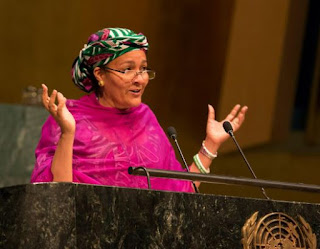The UN Reform Agenda Timelines
This is an important time for the UN with reform ideas in the air.
Do
you as a ‘stakeholder’ want to have a say – well the system is now up and running
under the Deputy Secretary General (DSG) for you to do that. I made my initial
comments in a previous blog here. The first Secretary Generals Report can befound here. My advice is if you have some ideas now is the time to start
formulating them and discussing them with Member States and the DSGs Office.
The Deputy Secretary General is now leading the process to follow up
the publication of the Secretary General’s Report on the re-positioning of the United
Nations Development System to support the delivery of the 2030 Agenda for
Sustainable Development. The second report is due out in December. The
consultation that is envisioned – which I will outline later is this blog –
should help focus that second report. The
report and its recommendations will be considered during the Economic and
Social Council (ECOSOC) in its Operational Activities Segment of February 2018.
as had been requested by the Quadrennial Comprehensive Policy Review (QCPR)
mandate. The report includes the following priority tracks:
- The development of a system-wide strategic document for collective United Nations action to support the 2030 Agenda. In devising this document, we will continue to draw on the data and findings emerging from the outline of system-wide functions and capacities, which was delivered alongside the June report of the Secretary-General;
- Comprehensive proposals to improve the Resident Coordinator system, within the overall vision outlined by the Secretary-General in his June report;
- Specific recommendations to ensure more responsive and tailored United Nations Country Team configurations, including specific proposals to rationalize physical presence by individual entities; and a strategy to reposition and ensure common operational services/back-office functions as the standard model for Country Teams;
- A review of the United Nations development system’s regional functions, policy and data-management capacities, with a view to clarify the division of labor between Regional Economic Commissions, United Nations Department of Economic and Social Affairs (DESA) and United Nations operational entities; explore the possibility of co-location or pooling of policy capacities at the regional level; and review the existing United Nations regional coordination structures;
- Further engagement with Member States, heads of Governing bodies and concerned United Nations entities on the proposals presented by the Secretary-General to strengthen system-wide governance and oversight of the United Nations development system’s support to the 2030 Agenda; and
- The specific contours of the proposed “Funding Compact”, to explore reasonable options that could help improve the quality and predictability of resources allocated to the United Nations development system in return for greater effectiveness, transparency and accountability for system-wide results.
Consultation process Timetable
Consultation with Member States, UN and other Stakeholders (August to December):
Phase 1 August: General consultations on the SG's June
report and related ideas .
Phase 2 October: Focused discussion on priority areas (system-wide
strategic document, RC system, UN Country Team configurations, regional functions, policy
and data-management capacities, system-wide governance and oversight, funding
compact)
Phase 3 November: Final consultations on concrete proposals
ahead of the SG's December report
GA Second Committee: Operational Activities Item for
consideration - October (starting 25th) to December:
Second Secretary General Report comes out (December)
Economic and Social Council (ECOSOC) in its Operational Activities
Segment (February 27th to 1st of March 2018)
Reconvened GA Second Committee March 2018





Comments
Post a Comment